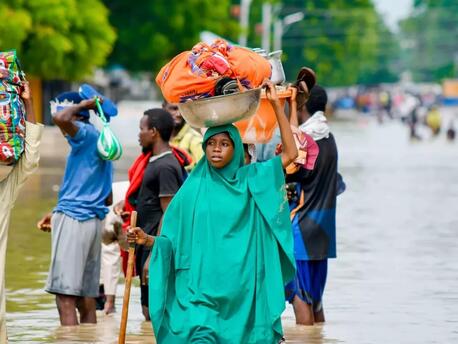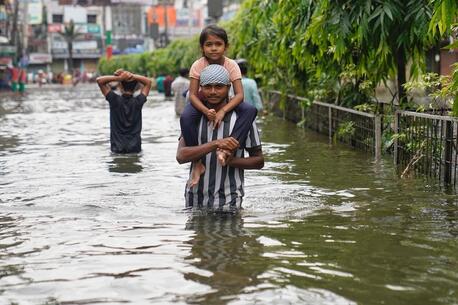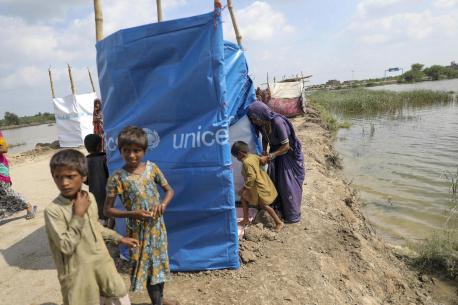
4 Ways UNICEF Is Delivering for Pakistan’s Children
Historic floods have been devastating. UNICEF is on the ground, working with partners to support families.
The scale of the devastation caused by historic monsoon rains in Pakistan is difficult to comprehend. Around 33 million people have been impacted by the ‘super floods’ – the worst flooding in more than a century – which have left at least 3.4 million children in need of lifesaving support.
Young children are living in temporary shelters or out in the open with their families, with no drinking water, no food, and no livelihood, exposed to a wide range of new flood-related risks and hazards — including from damaged buildings, drowning in floodwaters and snakes. The vital infrastructure that children rely on has been damaged and destroyed, including thousands of schools, water systems and health facilities.
UNICEF has been on the ground since the crisis began, supporting the Government of Pakistan’s flood response, dispatching emergency supplies and delivering support to children and families who need it the most.
1. Delivering safe water and hygiene supplies
The second wave of the disaster is already hitting hard with outbreaks of watery diarrhea, typhoid and malaria now increasing rapidly as millions of people sleep outdoors near stagnant water. Many people are forced to drink contaminated water and practice open defecation. The dangers of disease-carrying mosquitoes, snakebites, and skin and respiratory diseases are also rising.
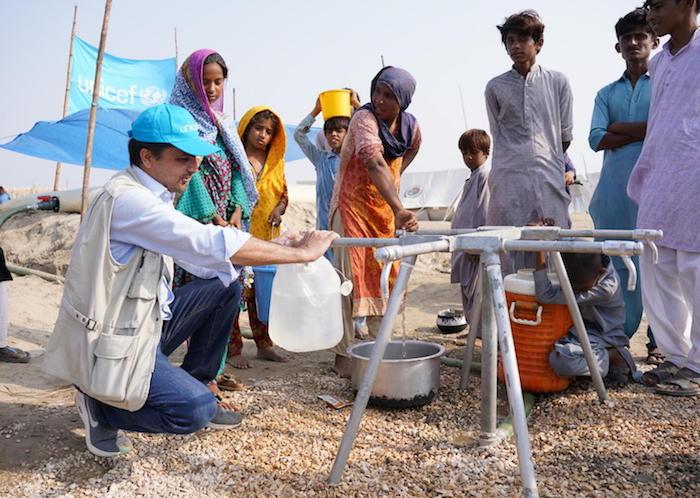
UNICEF WASH Officer Ihsan Ullah Khan fills a jug with safe drinking water at a collection point connected to a water bladder installed by UNICEF at a camp for people affected by flooding in Thari Mirwah, Khairpur District, Sindh Province, Pakistan, on Sept. 13, 2022. © UNICEF/UN0707019/Butt
The water took my hens, my goat, my books and my bag. It took all the things from our home. — Rukhsana, 8
UNICEF is trucking in safe drinking water, installing water filtration plants and restoring damaged or destroyed water systems. UNICEF is also reaching thousands of people affected by the floods with hygiene kits, health and safety information, and water purification tablets.
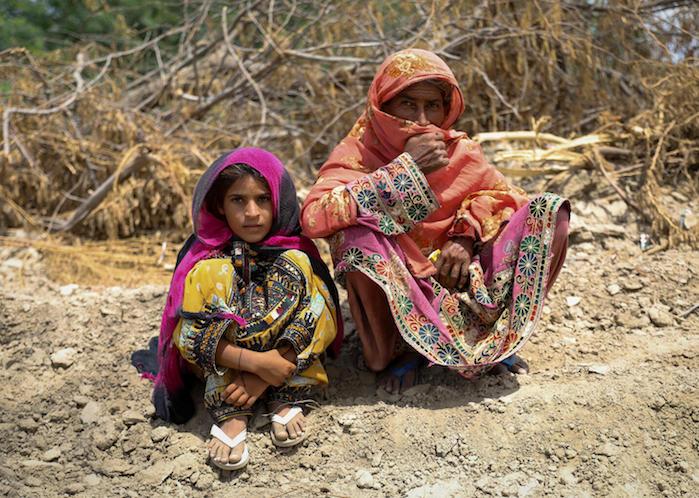
On Sept. 6, 2022, 8-year-old Rukhsana and her mother wait to receive a UNICEF WASH (water, sanitation and hygiene) kit in Lasbela district, Balochistan Province, Pakistan. "There was a lot of water ... up to here," said Rukhsana, pointing to her shoulder. "The water took my hens, my goat, my books and my bag. It took all the things from our home." © UNICEF/UN0701805/Zaidi
2. Supporting good nutrition
The floods impacted parts of Pakistan where children already suffered some of the highest rates of chronic and acute malnutrition. In some areas, 40 percent of children were already stunted, a condition caused by chronic undernutrition, before the floods hit. Increases in diarrhea and decreased access to food following the floods are compounding pre-existing poor nutrition.
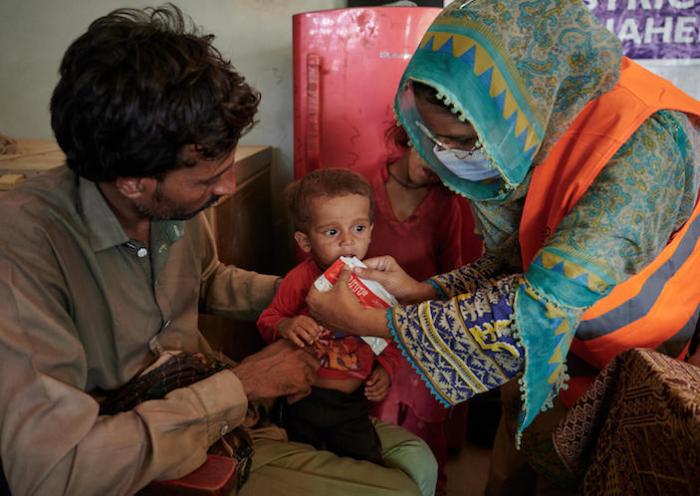
After diagnosing 1-year-old Azaan Ali with severe acute malnutrition, a community health worker shows his father, Saaein Bakhsh, how to administer Ready-to-Use Therapeutic Food (RUTF) at a UNICEF-supported mobile health clinic in Shaheed Benazirabad district, Sindh Province, Pakistan, on Sept. 12, 2022. "My children are hungry and they are falling sick," said Bakhsh. "I can’t sleep at night when I think about their hunger." © UNICEF/UN0705935/Noorani
My children are hungry and they are falling sick. I can’t sleep at night when I think about their hunger. — Saaein Bakhsh
UNICEF has reinforced its ongoing nutrition programs in the four provinces affected by the flooding and has also initiated new responses in the badly affected districts of Balochistan and Sindh. For example, UNICEF has established outpatient therapeutic feeding programs that have reached thousands of children and pregnant and breastfeeding women.
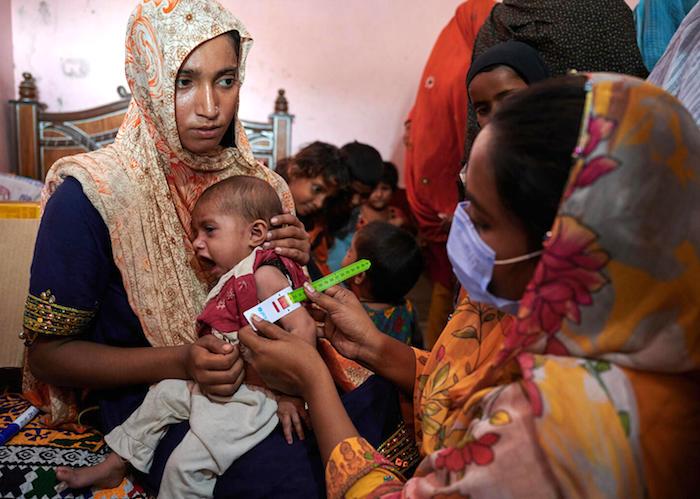
A health worker screens a young child for malnutrition by measuring the circumference of his mid-upper arm at a UNICEF-supported mobile health unit for flood-affected communities in Jano Lander village, Shangar district, Sindh Province. Pakistan. Red markings indicate the child is suffering from severe acute malnutrition, which can be fatal if left untreated. © UNICEF/UN0708001/Noorani
3. Helping children access learning
Thousands of schools across the country have been damaged or destroyed due to the floods, compounding the disruption to learning many children experienced during COVID-19 pandemic school closures.
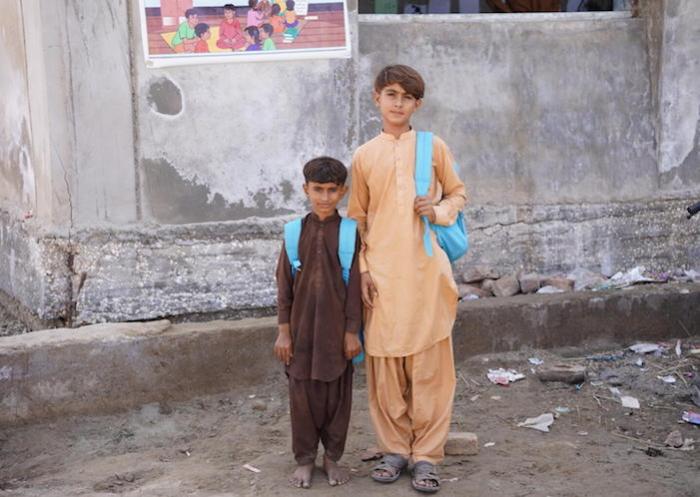
Ten-year-old Adeel, left, and his 14-year-old brother, Ammal, outside the Temporary Learning Center set up by UNICEF in a camp for people displaced by flooding in Moenjodaro, Larkana district, Sindh Province, Pakistan. "I used to cry a lot when I first came to this camp because I missed my home," Ammal said. "I even went back to check on my village one day but it was still inaccessible due to the flood water. Then one night I found my younger brother Adeel crying in a corner and I realized that I needed to be strong for his sake. I never cried after that day and I enrolled in this center along with Adeel. We are making new friends now and are hopeful that we will return to our village one day." © UNICEF/UN0706925/Butt
I used to cry a lot when I first came to this camp because I missed my home. — Ammal, 14
UNICEF has established Temporary Learning Centers in flood-affected districts, reaching children with education services and supplies including recreation kits, blackboards, school bags, tents and face masks.
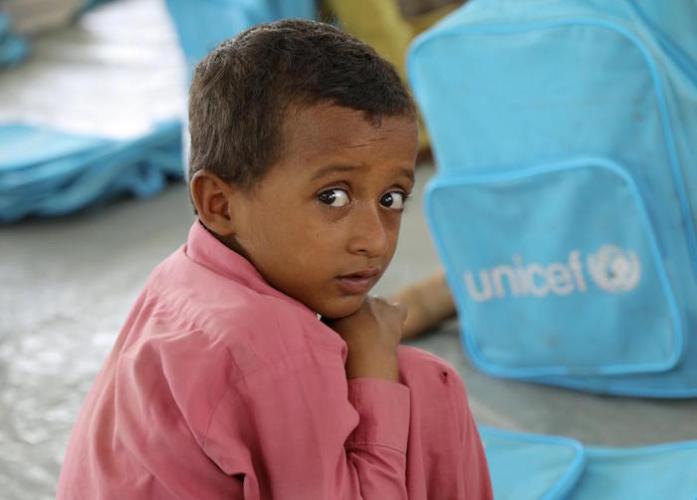
Sarfraz, 5, received a UNICEF bag, books and school supplies on his first day at a Temporary Learning Center in Lasbela district, Balochistan Province, Pakistan. His elementary school was badly damaged by floodwaters. © UNICEF/UN0701871/Zaidi
4. Providing psychosocial support
Any emergency on this scale increases risks for children, undermining their resilience and psychosocial well-being and leaving many in shock and experiencing severe distress from witnessing the devastation and losing their loved ones, their homes and cherished possessions.
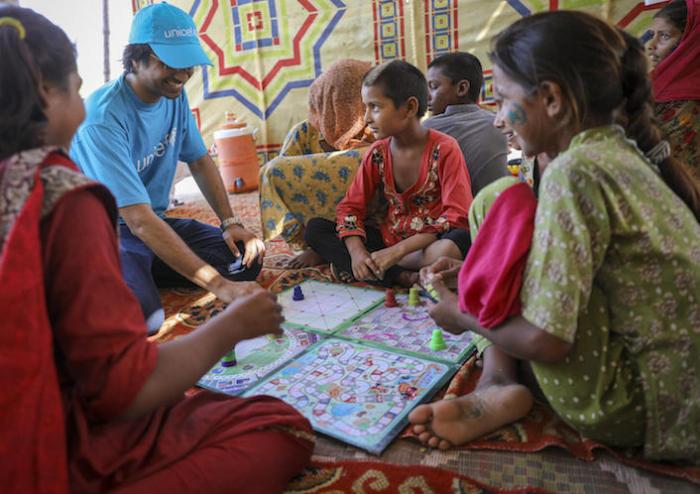
UNICEF Communication Officer Moeed Hussain plays board games with children at a Child-Friendly Space set up by UNICEF in the government-run campsite in Areeja Village, Mohen Jo Daro, Larkana district, Sindh Province, Pakistan. © UNICEF/UN0702949/Zaidi
The Child-Friendly Spaces and Temporary Learning Centers that UNICEF is establishing aren’t just about helping children continue their education — they also bring back a much-needed sense of normalcy to children’s lives and help them cope with the trauma they've experienced.
With millions of people displaced, UNICEF is working with partners to ensure that children who are separated from parents or caregivers are identified, protected and reunited with their families. UNICEF is also working in communities to provide information on child protection risks and available child protection services, supporting community-based mental health and psychosocial support.
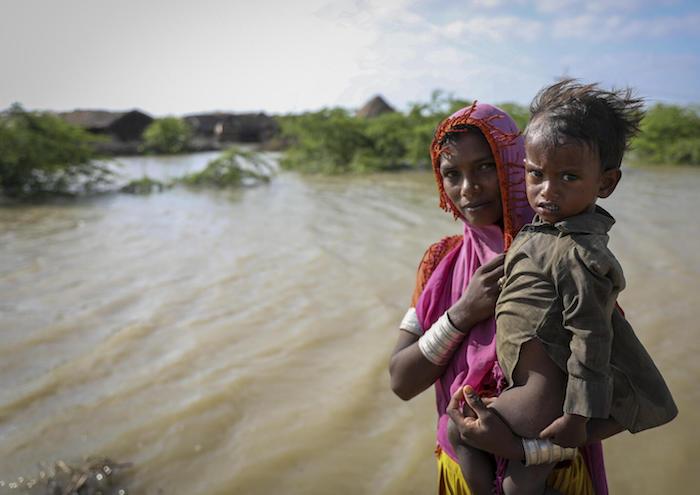
A mother and her 16-month-old child, Hera, beside floodwaters near their village in Umerkot district, Sindh Province, Pakistan. © UNICEF/UN0698977/Zaidi
Climate change is making extreme weather events such as the floods in Pakistan more frequent and more destructive, and it is children who are too often paying the price. Learn more about UNICEF's work to address the climate crisis.
Children and families in Pakistan need help now. Your contribution can make a difference. Please donate today.
This article originally appeared on UNICEF.org
HOW TO HELP
There are many ways to make a difference
War, famine, poverty, natural disasters — threats to the world's children keep coming. But UNICEF won't stop working to keep children healthy and safe.
UNICEF works in over 190 countries and territories — more places than any other children's organization. UNICEF has the world's largest humanitarian warehouse and, when disaster strikes, can get supplies almost anywhere within 72 hours. Constantly innovating, always advocating for a better world for children, UNICEF works to ensure that every child can grow up healthy, educated, protected and respected.
Would you like to help give all children the opportunity to reach their full potential? There are many ways to get involved.



